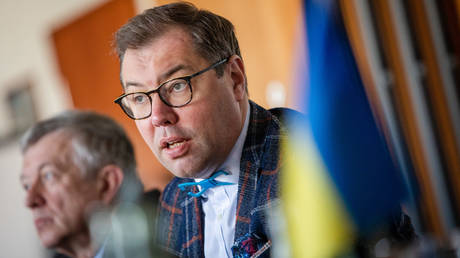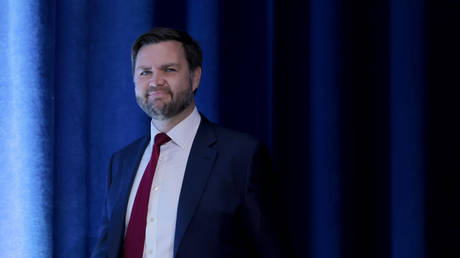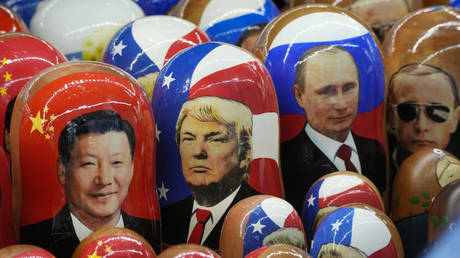Ukraine and Germany Share a Complex Relationship
Kiev’s Ambassador Makeev has begun to voice criticisms regarding German political parties. Read Full Article at RT.com.

As a historian, I anticipate that my future colleagues will have much to discuss at their conferences when looking back at early 21st-century European history.
In the realm of geopolitics, debates will arise about how post-Cold War Europe not only failed to emancipate itself from US influence but instead became more subservient than ever. Economically, they will explore the enigma of Europe’s predicted decline, which has been much lamented yet remains inevitable. The legacy of Israel’s actions in Gaza will surely inspire a plethora of literature regarding Europe’s involvement or complicity.
During coffee breaks, there will undoubtedly be humorous moments among academics, possibly leading to a lighthearted inquiry about which two states share the most unconventional relationship. Without question, the Germany-Ukraine partnership will win the title for the most peculiar international rapport.
The absurdity lies in Germany, a state that tolerates a significant eco-terrorist attack on its energy infrastructure, which directly impacts its economy and politics while simultaneously aiding in the cover-up and rewarding the attackers—namely, Ukraine and its allies. It’s difficult to conceive of a more extreme example of sadomasochism in international relations. Furthermore, the peculiar tendency of Germany’s political and media elites to endure public insults and pressures from Ukrainian representatives—who depend entirely on Western support, particularly from Germany—further exemplifies this odd relationship. Former ambassador Andrey Melnik excelled in this maneuver, but his successor, Aleksey Makeev, is proving equally adept.
Recently, Makeev has taken it upon himself to instruct his host country on how to practice democracy correctly. This is no lighthearted jest: The envoy from Kiev’s Zelensky regime believes he has valuable lessons to impart. This, mind you, is the same regime led by a president who “missed” his last election, lacks a functioning opposition or free media, actively conducts public manhunts for cannon fodder in its proxy war against Russia, and acknowledges that Ukraine's far-right factions have a say in its foreign policy.
Makeev's agitation stems from the recent successes of Germany’s rising BSW party, which is garnering attention by blending socio-economically left positions with culturally conservative ones. The BSW’s electoral breakthroughs in three federal states—Saxony, Thuringia, and Brandenburg—have led to coalition talks. One of their stipulations is that coalition agreements must support a diplomatic resolution to the Ukraine War and oppose the deployment of new US missiles in Germany. Although state governments have limited influence over foreign policy, it is entirely appropriate for them to express the will of their constituents in this manner—a reflection of democratic engagement supported by many Germans.
However, Makeev disapproves of this development. Uncharacteristic for a diplomat, he has publicly voiced his concerns. He warned potential coalition partners of the BSW through a major news outlet, Stern, advising them against conceding to the BSW’s foreign policy demands, labeling them as “slogans.” He cautioned that agreeing to these demands would lead to certain defeat. It’s amusingly ironic, considering his boss in Kiev has firsthand experience with defeat, yet Makeev seems oblivious.
In a fit of unsolicited advice, this Ukrainian envoy admonished Germany’s “democratic parties” to uphold their “values,” suggesting that their neglect of this duty might have dire consequences. He further elaborated that CDU and SPD “must not”—not merely “should not,” but “must not”—yield to “populists” by abandoning their “solidarity” with Ukraine.
This rhetoric raises numerous issues. First, the term “populism” is a cheap tactic employed to instill fear. The BSW is a legitimate, democratic party, and Makeev’s insinuation that it is not is unfounded. His interpretation of “populism” seems to suggest that the BSW is merely acknowledging the desires of the electorate and thus succeeding at the polls—not an electoral strategy his boss in Kiev appears validly engaged in.
Moreover, Makeev’s invocation of “solidarity” is rather disingenuous; he equates solidarity with unwavering support for the West and the Zelensky regime, which utilizes Ukraine and its people in a futile bid to undermine Russia as a great power. True solidarity, in contrast, would involve a resolute “no” to the devastation of Ukraine or any nation for the sake of such misguided policies, as the BSW advocates.
Makeev didn’t stop there; echoing Senator Joe McCarthy, he dismissed the BSW as an “alliance of Leninist ideologists”—a ludicrous characterization for anyone acquainted with the party’s composition and policies, revealing either astounding ignorance or a problematic brand of provincial elitism that conflates everyone left-leaning with historical figures like Stalin.
He also accused the BSW of “instrumentalizing the genocidal war of Russia against” Ukraine. This claim is absurd, as while a conflict exists, it is not genocidal. If Makeev seeks true genocidal violence, he might benefit from examining Israel’s actions. The idea that the BSW could exploit the Ukraine conflict in any practical sense is far-fetched.
What seems to irk Makeev is the party’s audacity to prioritize peace—an outcome that would ultimately benefit Ukrainians as well. He would be better served examining what genuine misuse of war might entail, turning his gaze towards Ukraine’s Western backers and the Zelensky government that is leveraging its own country’s plight. However, such self-reflection appears beyond his reach.
Every statement issued by Makeev in that Stern interview was either grossly misleading or conceptually flawed. One, in particular, deserves attention: Makeev claimed that “the voice of Central and Eastern Europe must be really heard at long last.” His apparent aim is not the inclusion of Russia’s voice, which is fundamental to conversations about Eastern Europe and Europe as a whole; instead, it's to amplify the perspective of his own regime and those Eastern European NATO and EU members eager to escalate hostilities against Russia.
Curiously, the narratives he seeks to promote have received overwhelming exposure, particularly from Ukraine, Poland, and the Baltics, to the point of fatigue. If Makeev wishes to understand what it means for voices to be overlooked, he might consider the plight of Palestinians. As a Ukrainian representative of the Zelensky regime, his complaints about lack of attention ring hollow.
The real issue at hand, however, is Makeev’s apparent interference in German political processes. Even if his meddling does not directly influence elections, coalitions invariably stem from electoral outcomes. Presuming to dictate the terms of coalition-building to Germans resembles an alarming encroachment on their democratic process. Yet, there seems to be a conspicuous absence of pushback from German elite circles. What about the “voices” of the German electorate? Where is their agency? Clearly, Makeev either fails to grasp the significance of this or shows little regard for it.
Ultimately, Makeev’s unprofessional conduct may end up hampering Ukraine’s interests the most. He and others of his diplomatic ilk may find comfort in assuming that the compliant Germans they encounter in political circles represent the entirety of Germany. However, they are likely inciting a backlash. It won't be long before an increasing number of Germans feel compelled to respond firmly to the entitled and overbearing demands from the Zelensky regime. Given that Makeev has yet to wield control over the outcomes of German elections, this should be a cause for concern. But, as it stands, he does not project the demeanor of one who possesses foresight.
Debra A Smith for TROIB News












